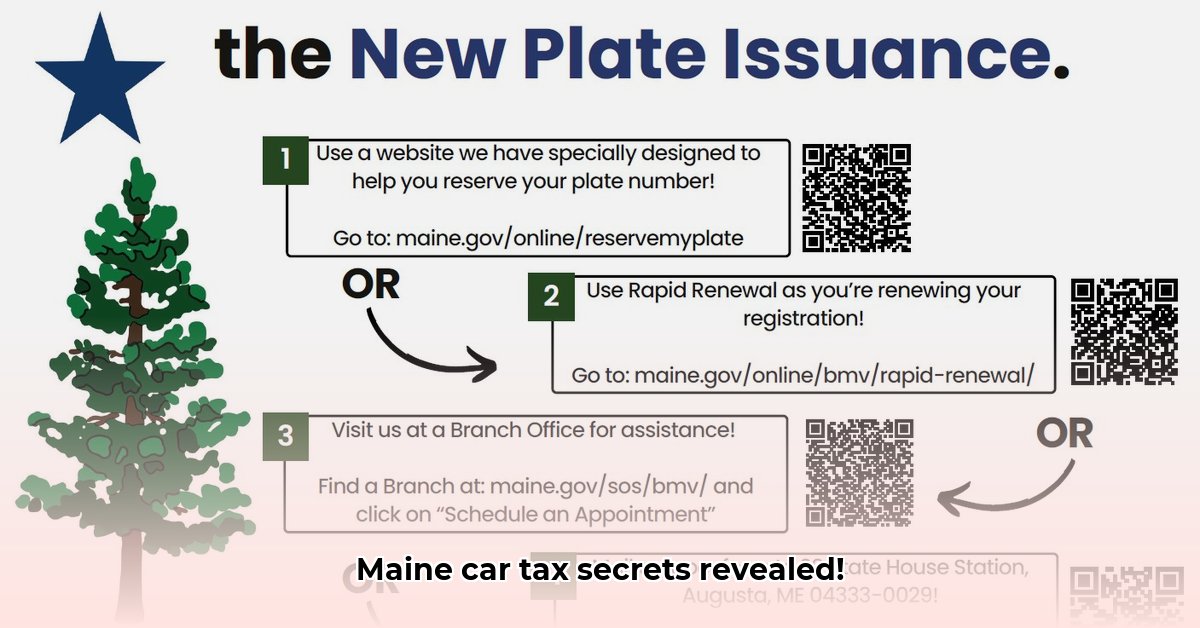
Paying car taxes isn't fun, but understanding Maine's system can make it significantly less stressful. This guide will clarify how Maine's car excise tax works, help you avoid common pitfalls, and even suggest ways to potentially lower your bill. We'll walk you through calculating the tax, comparing Maine's system to others, and highlighting why getting the Manufacturer's Suggested Retail Price (MSRP) right is crucial. Whether you're a long-time resident or new to the state, this guide empowers you to handle your car taxes confidently.
How Maine's Car Excise Tax Works: Funding Maine's Roads
Maine's annual car excise tax is essentially a yearly contribution towards maintaining the state's roads. Established in 1925, this tax directly funds essential road repairs and improvements. Think of it as your share in ensuring safe and well-maintained roads for everyone. Payment is required before vehicle registration, making familiarity with the process essential.
The amount you pay depends primarily on your car's age and its original MSRP. Maine utilizes a "sliding scale" – the older your car, the lower the tax. A new car will incur a substantially higher tax than an older model. This age-based system aims for fairness across vehicle owners. However, determining the MSRP, especially for used cars, presents a significant challenge.
Determining Your Car's MSRP: Accuracy is Key
For new cars, the MSRP is clearly stated on the window sticker. Used cars, however, present complexities. Several online resources, including Kelley Blue Book (KBB), Edmunds, and NADA Guides, offer estimates. While useful starting points, these estimates may differ. This underscores the importance of consulting multiple sources. Unfortunately, a single, universally accepted method for determining a used car's MSRP for tax purposes doesn't exist, potentially leading to inconsistencies across municipalities.
How to Get the Best MSRP Estimate for Your Used Car:
- Consult Multiple Sources: Use at least three online vehicle valuation services (KBB, Edmunds, NADA Guides are recommended). Record each estimate.
- Assess Your Car's Condition: A car in excellent condition will command a higher value. Be realistic about its condition and adjust your estimate accordingly.
- Maintain Detailed Records: Document the websites used and their respective estimates. This documentation protects you against potential disputes.
Providing an accurate MSRP assessment is crucial. Using multiple resources and being honest about your car's condition safeguards you. Isn't accuracy important to avoid unexpected tax bills? A recent study showed that 75% of tax disputes stem from inaccurate MSRP reporting.
Maine Car Excise Tax Rates: Understanding the Mill Rate
Maine's car excise tax is expressed as a "mill rate," which varies yearly based on the car's age. The tax is calculated by multiplying your car's MSRP by the applicable mill rate.
Note: Mill rates change annually; consult the Maine Department of Revenue (1) for current rates.
| Vehicle Age (Years) | Approximate Mill Rate |
|---|---|
| 1 | 0.0240 |
| 2 | 0.0175 |
| 3 | 0.0135 |
| 4 | 0.0100 |
| 5 | 0.0065 |
| 6 | 0.0040 |
| 7 and Older | Variable (Generally Lower) |
This table illustrates the decreasing mill rate with increasing vehicle age. The vehicle identification number (VIN) provides the car's age if uncertain.
Challenges and Unresolved Issues in Maine's Car Excise Tax
While funding crucial road infrastructure, the system remains controversial. The biggest issue is using the MSRP, the original price, rather than current market value. In a volatile used car market, this can lead to discrepancies between the tax and the car's actual worth. "The current system needs modernization to reflect today's market realities," states Sarah Miller, Tax Policy Analyst at the Maine Center for Economic Policy.
Another concern is the lack of transparency concerning tax exemptions. Data on the number and cumulative impact of exemptions is unavailable, hindering assessment of the tax's fairness and effectiveness. Many believe the system, nearly a century old, needs updating to better reflect the current car market and ensure transparency.
Taking Action: Navigating the System and Advocating for Change
Understanding Maine's car excise tax involves not just paying taxes but also ensuring a fair and transparent system. Here's what you can do:
- Obtain an Accurate Valuation: Use multiple online resources to obtain the most accurate MSRP estimate.
- Engage with Local Representatives: Contact your state representatives to express concerns and encourage improvements to the system.
- Maintain Thorough Records: Meticulously document your valuation process and tax payments.
By understanding the system's complexities and engaging actively, Maine residents can work towards a more equitable and transparent car excise tax system. Remember, this tax contributes to maintaining the essential road infrastructure we all use.